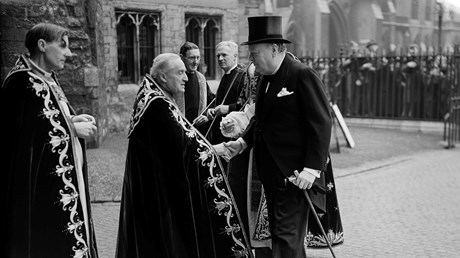A new biography sorts through the British prime minister’s enigmatic faith.

In the popular Netflix series The Crown, Winston Churchill first appears at the 1947 wedding of Princess Elizabeth. Two years removed from leading Great Britain to victory in World War II, the former prime minister enters Westminster Abbey to the sound of a patriotic hymn by Cecil Spring Rice: “I vow to thee, my country, all earthly things above, / Entire and whole and perfect, the service of my love.”
Tellingly, we don’t hear the second verse, which turns from the United Kingdom to God’s kingdom: “We may not count her armies, we may not see her King; / Her fortress is a faithful heart, her pride is suffering.” The Crown’s way of introducing Churchill may be one of the many liberties that series takes with British history, but it seems appropriate for a politician who was more devoted to his country’s system of government than to the doctrines of the church that Elizabeth still heads.
If you’re enough of a Churchill fan to have devoured Andrew Roberts’s magisterial 2018 biography and yet wanted to read more about religion than Roberts’s brief but trenchant discussion of that topic, you may want to pick up Gary Scott Smith’s short study Duty and Destiny: The Life and Faith of Winston Churchill, part of the Library of Religious Biography series from Eerdmans. (My own entry in the series releases later this year.) The book portrays a statesman driven both by duty to country and empire (“the service of my love”) and by what Smith calls “a profound sense of his own destiny.” Yet the answer to “who or what he believed determined his destiny—God or fate—is ultimately unclear.”
If not a groundbreaking work of original ...
from Christianity Today Magazine
via


.gif)

.gif)
.gif)
